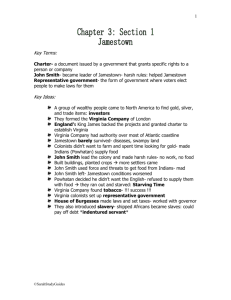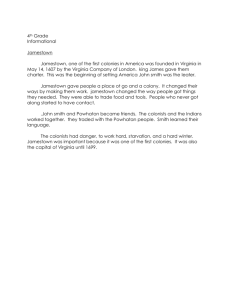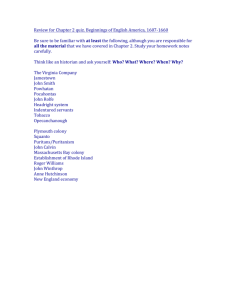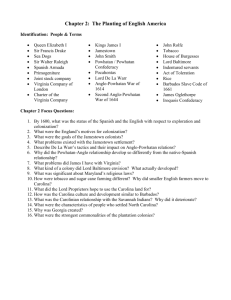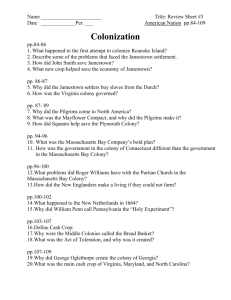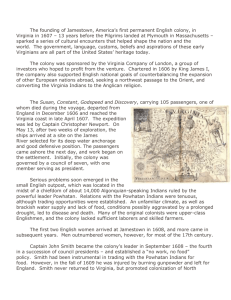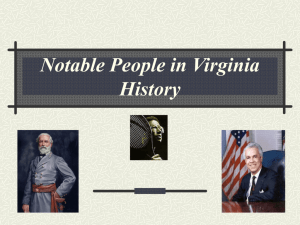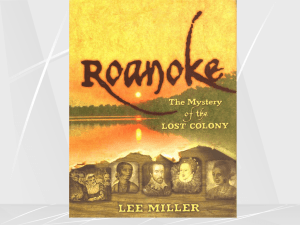Social Studies – Midterm – 7th grade KEY TERMS AND PEOPLE
advertisement
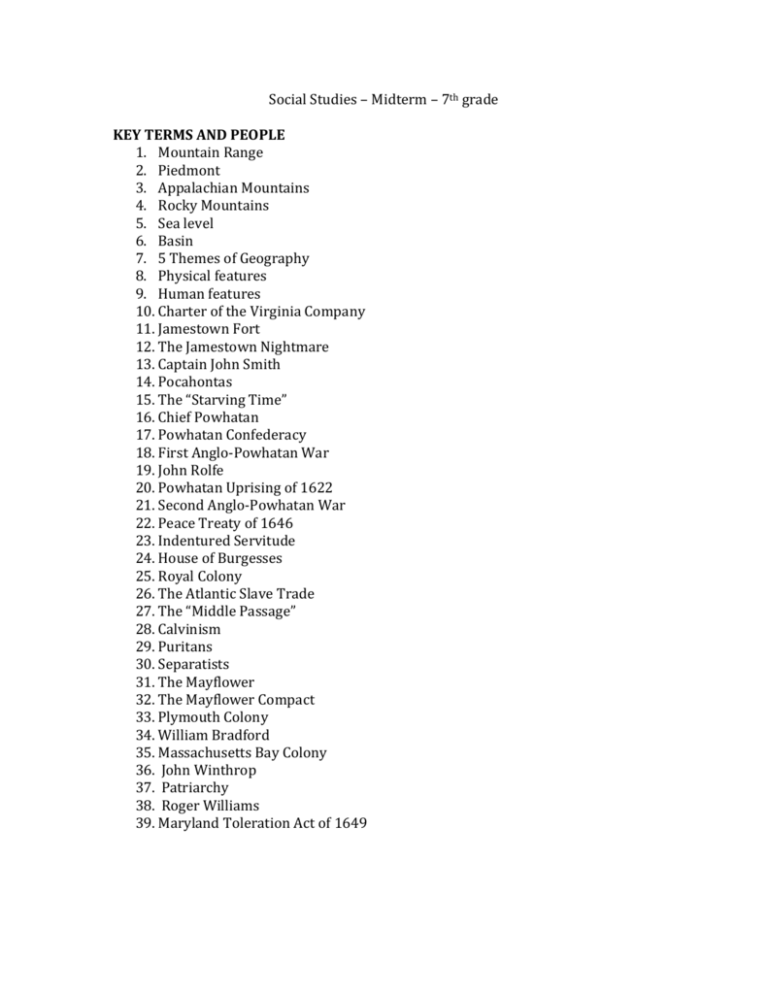
Social Studies – Midterm – 7th grade KEY TERMS AND PEOPLE 1. Mountain Range 2. Piedmont 3. Appalachian Mountains 4. Rocky Mountains 5. Sea level 6. Basin 7. 5 Themes of Geography 8. Physical features 9. Human features 10. Charter of the Virginia Company 11. Jamestown Fort 12. The Jamestown Nightmare 13. Captain John Smith 14. Pocahontas 15. The “Starving Time” 16. Chief Powhatan 17. Powhatan Confederacy 18. First Anglo-Powhatan War 19. John Rolfe 20. Powhatan Uprising of 1622 21. Second Anglo-Powhatan War 22. Peace Treaty of 1646 23. Indentured Servitude 24. House of Burgesses 25. Royal Colony 26. The Atlantic Slave Trade 27. The “Middle Passage” 28. Calvinism 29. Puritans 30. Separatists 31. The Mayflower 32. The Mayflower Compact 33. Plymouth Colony 34. William Bradford 35. Massachusetts Bay Colony 36. John Winthrop 37. Patriarchy 38. Roger Williams 39. Maryland Toleration Act of 1649 KEY QUESTIONS 1. Why is it important that we study geography? 2. How would our way of life be different if the climate of NYC was colder? Warmer? 3. What are the 5 Themes of geography? Why is it important that we study them? 4. What were the reasons for European migration to the Americas in the 17th Century? 5. What was the Charter of the Virginia Company? Why was it important to the colonists who decided to settle in the New World? 6. What were the pros and cons of living in Jamestown? 7. What was the Jamestown Nightmare? How could it have affected future settlements in the New World? 8. Why was 1619 a pivotal year for the Chesapeake settlement? 9. What effects did tobacco have on Virginia’s economy? 10. What was indentured servitude? Why did it become popular in the colonies? 11. What led King James I to make Virginia a royal colony? 12. What led to the sudden increase in the population of Africans in the colony at the end of the 17th Century? 13. Why was Maryland founded? What was the Maryland Toleration Act of 1649? How did it shape the future of the colonies? 14. What were the characteristics of the New England Settlements? BE PREPARED TO WRITE AN ESSAY (INTRODUCTION, BODY PARAGRAPHS, CONCLUSION) ON THE FOLLOWING TOPIC: Compare and contrast the Virginia settlement and the New England settlement. FEEL FREE TO PREPARE FOR THE ESSAY BEFOREHAND, BUT NOTES WILL NOT BE ABLE TO BE USED ON THE EXAM. Social Studies – Midterm – 8th Grade KEY TERMS AND PEOPLE 1. 10% Plan 2. 10%+ Plan 3. 13th Amendment 4. 14th Amendment 5. Black Codes 6. Sharecropping 7. Abraham Lincoln 8. Andrew Johnson 9. Wade-Davis Bill 10. Emancipation Proclamation 11. Impeachment 12. 15th Amendment 13. 16th Amendment 14. Civil Rights Act of 1875 15. Ulysses S. Grant 16. William Marcy Tweed 17. The Panic of 1873 18. “Grantism” 19. Rutherford B. Hayes 20. The “Big Four” Railroad Magnates 21. Cowboys 22. Gunslingers 23. “Boom” Towns 24. The Cattle Trails 25. Steel Plow 26. Mining 27. Barbed wire 28. Dry Farming 29. Bonanza farm 30. Hybridization 31. Improved Communication 32. Thomas Edison 33. Alexander Graham Bell 34. George Westinghouse 35. Wright Brothers 36. Henry Ford 37. Motel T Automobile 38. Laissez Faire 39. Social Darwinism 40. John D. Rockefeller 41. Standard Oil Co. 42. Gustavus Swift 43. Andrew Carnegie 44. The Assembly Line 45. The Gospel Of Wealth 46. Child Labor 47. “Tools” of Management 48. “Tools” of Labor 49. “Scabs” 50. Knights of Labor 51. The Great Railroad Strike of 1877 52. The American Federation of Labor 53. Tenements 54. Triangle Shirtwaist Factory Fire KEY QUESTIONS 1. What were the effects of Johnson’s 10%+ Plan? 2. What was the Emancipation Proclamation? What effect did it have on the Civil War? 3. What were the positive and negative effects of the 13th and 14th Amendments? 4. What were some of the challenges newly freedmen faced in the South during Reconstruction? 5. What were the black codes? How did it affect life of newly freedmen? 6. Why was President Johnson impeached? Why wasn’t he removed from office? 7. Why were women’s rights groups furious about the 15th amendment? 8. Why did the Federal government fail to enforce the Civil Rights Acts? 9. What were the pros and cons of the Civil Rights Act of 1875? 10. What were the effects the Grant administration had on the people’s trust in government? 11. What were the effects of the Panic of 1873? 12. What was the significance of Bradwell vs. Illinois? 13. What national issues emerged in the process of closing the Western frontier? 14. Why does the West hold such an important place in the American imagination? 15. In what ways is the West romanticized in American culture? 16. What were 2 of the key tensions that were going on during the Westward Expansion? How did they have an effect on the lives of those moving west? 17. What were some of mining’s economic impacts? 18. How was farming turned into a business during the expansion of the West? 19. What were the myths vs. realities of the Wild West? 20. What were 5 causes of rapid industrialization? 21. How did the railroads fuel the growing US economy? 22. What led to the rise in patents granted in the United States? 23. Is the Protestant “work ethic” idea of the “Self-made man” a myth? Explain 24. What was the Gospel of Wealth? How did it characterize industrialization during this time? 25. What were the effects of industrialization on children? 26. Who were the Knights of Labor? What did they advocate for in the workplace? 27. What were effects of the Great Railroad Strike of 1877? 28. What were some ways the American Federation of Labor fought for the rights of workers? BE PREPARED TO WRITE AN ESSAY (INTRODUCTION, BODY PARAGRAPHS, CONCLUSION) ON THE FOLLOWING TOPIC: Industrialization increased the standard of living and the opportunites of most Americans, but at what cost? What were the positive and negative effects of industrialization? Are we in an industrial revolution today? Use examples to support your rationale. FEEL FREE TO PREPARE FOR THE ESSAY BEFOREHAND, BUT NOTES WILL NOT BE ABLE TO BE USED ON THE EXAM.


